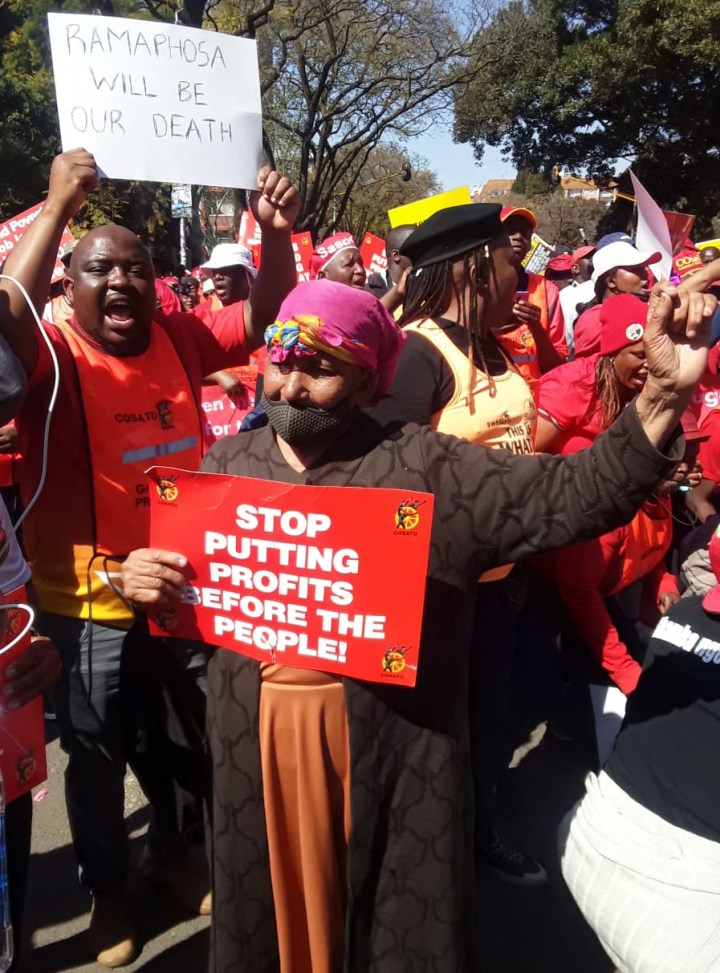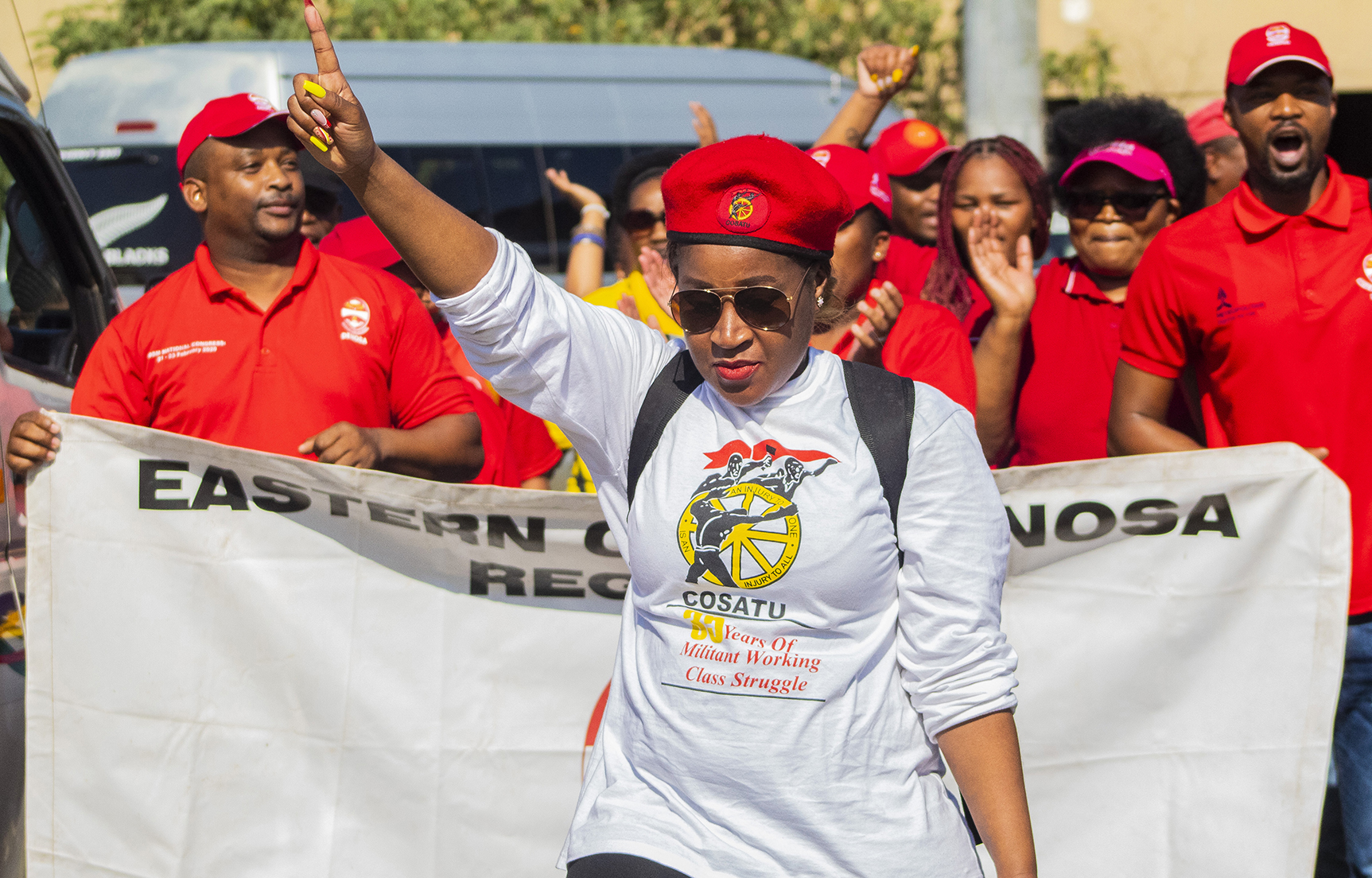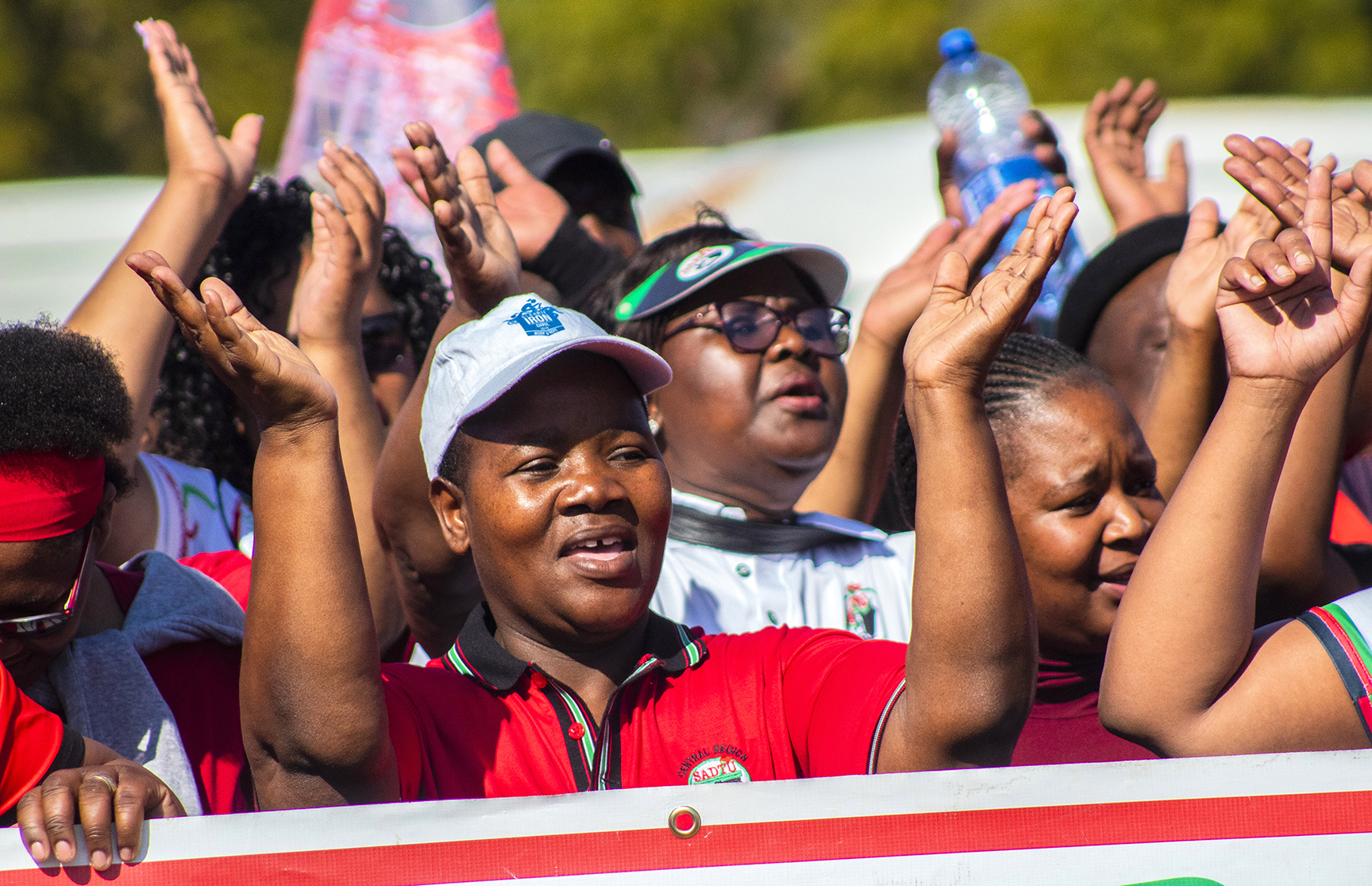WEDNESDAY PROTEST
Pickets get under way as fresh stats reflect growing cost-of-living crisis in South Africa

Workers gathered in parts of the country on Wednesday to make a stand against the rising cost of living. By all accounts, organised activities took a while to warm up. Reporting team: Karabo Mafolo, Victoria O’regan, Shiraaz Mohamed, Suné Payne, Hoseya Jubase and Bheki Simelane.
‘This march is a starting point to getting ordinary people to become aware that the personal and financial crisis they’re encountering is a bigger part of this country’s social problems,” Trevor Ngwane, an activist and academic who researches social movements and protests at the University of Johannesburg, told Daily Maverick on Wednesday morning.
As protesters gathered, Statistics South Africa released the latest figures reflecting the increased cost of living in the country, with rises in petrol, electricity and transport.
Across the country, workers affiliated with the two largest trade unions, the Congress of South African Trade Unions (Cosatu) and the South African Federation of Trade Unions (Saftu), started gathering on the streets in the morning to take part in the protests.

Democratic Nursing Organisation of South Africa members arrive at the Victoria sports grounds in King Williams Town on 24 August 2022, led by Thokozani Mtini, Cosatu’s provincial administrator and gender coordinator in the Eastern Cape. (Photo: Hoseya Jubase)
In Pretoria, a crowd had gathered by 11am and there were protests in the Johannesburg city centre, Durban and other provinces.
One of two separate protests in Cape Town was held by about 300 Saftu members who gathered on Hanover Street and headed to the civic centre to hand over their demand that food, electricity and fuel prices, as well as interest rates, be reduced. Their other demands included the insourcing of all security, cleaning, Expanded Public Works Programme and early childhood development workers.
At 12:50 they gathered outside the Civic Centre where they handed over their memorandum to Mayor Geordin Hill Lewis to sign. Protesters were due to proceed to the department of mineral resources.
Mayor Geordin Hill Lewis addresses protesters in Cape Town, 24 August, 2022. Video clip: Victoria O’regan
At the second march, more than 100 Cosatu members gathered outside Cape Town Station to follow up on the demands they made during a march in 2020 calling for a safe, affordable and reliable rail network.
Melvin de Bruyn, Cosatu’s provincial secretary, said that to date they had not received a response from Prasa. “We want to know what happened since 2020, is there an improvement, and when will the Metrorail be safe and reliable for our people.”
Cosatu’s demands also include solar panels for indigent households and a halt to the sabotage at Eskom.
Cosatu provincial secretary Malvern De Bruyn explaining the picket outside the Cape Town train station- a follow up to a march in 2020, calling for a safe, affordable and reliable rail network. @dailymaverick pic.twitter.com/ERH2hO6y84
— Suné Payne (@SunePayne) August 24, 2022
In the Eastern Cape, about 500 people had gathered at the Victoria Sports ground in King Williams Town by mid-morning. Andisile Pampila who is the chairperson for the COSATU Young Workers in the Eastern Cape said that young people were hard hit by the country’s problems. “The rate of unemployment especially undergraduates is more concerning in South Africa and this march is more relevant to make government accountable,” he said.
The day of protest action aims to send a “clear message” to government and employers “about the imperative action needed to change the prevailing economic situation which has worsened the livelihoods of workers and the poor”.
A crowd of about 300 people marched from Hanover St to the civic centre in Cape Town on Wednesday, 24 August, 2022. Video clip by VIctoria O’regan
Food goes up, pay stays the same
South Africans have had to grapple with the rising cost of living while many public servants haven’t had any wage increases. Business Maverick’s Ray Mahlaka reported that “pay rise negotiations in the public sector have not been productive or produced a firm agreement since they started in May”.
Globally, food prices have gone up. The World Bank has warned that “record high food prices have triggered a global crisis that will drive millions more into extreme poverty, magnifying hunger and malnutrition while threatening to erase hard-won gains in development”.
Workers gather in the morning for the protest action in Pretoria. Video clip by Shiraaz Mohamed.
Although Ngwane thought that from a collective bargaining perspective the march would have an impact, economic analyst Bongani Mahlangu told CapeTalk the march would not make a significant impact in the long term.
If the march was protracted “then maybe we may see certain damages taking place, but for today it is just, probably, a show of force, as stated earlier, that ‘we’re still around and we can command some numbers’,” Mahlangu said.
At a media briefing on Monday, Saftu general secretary Zwelinzima Vavi said the march should be “seen as the beginning of a process of mobilising the working class”.
‘No work, no pay’
The Department of Public Service and Administration said essential workers were not allowed to take part in the march during working hours. “The department has provided government departments with guidelines to apply the principle of ‘no work, no pay’ to manage those public servants who intend on participating in the strike action and to put necessary contingency plans [in place] to deal with service delivery disruptions,” it said.
Wednesday’s mass action has also been joined by ANC employees, who have regularly not been paid on time while the provident fund, unemployment insurance fund and medical aid have been unpaid since 2018.
High living costs and poor pay: what led to the national shutdown?
Maverick Citizen’s Mark Heywood urged Cosatu, Saftu and the South African Police Service “to do everything they can to ensure the protest is not hijacked, does not turn violent or lead to further destruction of infrastructure and life”.
Although protests often lead to the disruption of public transport, making it harder for pupils to get to school, the Gauteng education department said all of its districts had reported that schooling had been uninterrupted.
Gauteng education MEC Panyaza Lesufi appealed to marchers not to disrupt schools because they were preparing for preliminary matric exams.
Public transport might not be a problem because the South African National Taxi Council (Santaco) announced on social media that it would not take part in the strike.

Protesters sing Struggle songs as they arrive at the Victoria sports ground in King Williams Town on 24 August 2022. (Photo: Hoseya Jubase)
However, people who rely on public transport haven’t been spared hardship – taxi fares jumped in July, rising by 9% from June and taking the annual rate to 16.4%.
Coinciding with the protests on Wednesday, the latest Stats SA figures showed that electricity tariffs increased on average by 7.5%, which is the benchmark approved by the National Energy Regulator of South Africa. It is lower than last year’s rise of 13.8% but higher than the 6.3% hike in 2020.
Consumers have also been hit by more fuel price increases. Transport costs were up by 4.8% between June and July, with fuel rising by 9.4%. Fuel is 56.2% more expensive than it was 12 months ago, with the price of a litre of inland 95-octane petrol rising from R17,39 in July 2021 to R26,74 in July 2022. The average price for diesel rose from R16,58 to R26,61 per litre over the same period. DM
‘Somebody has to do something’
There were few signs of unity in the early hours of the protest action in Pretoria and Johannesburg.
Members of both Saftu and Cosatu kept apart early on as they gathered in Johannesburg.
Burgers Park in Pretoria was to be the meeting point after the unions had told the media they would march jointly. But as the march gained momentum, Saftu members were seen moving away from a group of Cosatu members and seemed to be splitting to gather at a different location.
Both union members appeared committed and energised as they sang and danced around.
“What do you mean by what the strike will achieve? Strikes are meant to achieve one thing and that’s transformation in society. Everything is going up and up and there is no end to it. Petrol is up, dates are up. Where should we run?” Mavis Khanyile from Pretoria said.
Nomfundo Hadebe from Mabopane in Pretoria said: “I am here to support workers. I couldn’t sit when I heard the call. The country is almost on its knees and somebody has to do something. Much as I am unemployed, I feel that the unions are doing something.”
At the Union buildings, a small crowd of people gathered and waited for the other groups of marchers to join them.
Asked how she would measure the success of the march, Pinky Maduna from Sunnyside pointed to a small group of people. “Look at the crowd.”
Alfred Mashaba from Pretoria said later: “It’s all a fuss. Cosatu has ceased to be relevant, whether to its workers or their cause. This is just a political show. The unions have failed and it’s taking many people longer to figure this out. People need to forget about Cosatu.”
Asked why he had lost all faith in the unions, Mashaba said they had lost their usefulness but held on for political clout.
When this was put to some Cosatu members, they dismissed his claim as one motivated by jealousy. “Cosatu is a big organisation, whether people like that or not, but I would understand why others would be jealous of the movement,” Wiseman Vukeya from Johannesburg said.
By 1.30pm, the crowd at the Union Buildings had grown considerably from a small group to a few hundred.
However, an observer, Sbusiso Mzimela, said: “People are being taken for a ride by these unions. They have kept everyone away from their jobs because they do not know what struggles their members return to in their homes. I liken the unions to loan sharks.”
This is a developing story and has been updated.




















 Become an Insider
Become an Insider
Is anyone at these protests connecting the dots of the collapse of governance and corruption resulting in a weak economy with a lack of jobs and low wage competitiveness. Add our disastrous Covid response, a weak rand, Russia’s war and you have the current situation. Then ask yourself, where does the ANC and their alliance partners feature in all this?
The alliance partners have the day off to dance and sing in the streets?
When all is said and done one must ask what was achieved? All these people have done by not working today is potentially enabling the cost of living to increase!
To put it bluntly one gets the government one votes for and even if one does not vote, it is actually a vote for the current government! do the sums.
Vavi and Cosatu are doing this for themselves not for SA.